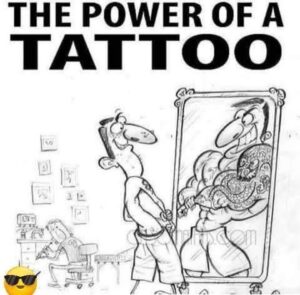
Your Tattoo Could Save Your Life: The Hidden Medical Potential of Body Ink
Tattoos have long been symbols of identity, rebellion, and personal stories. From tribal marks to modern minimalist art, inked skin tells tales the mouth sometimes can’t. But what if we told you that your tattoo might one day do more than just express who you are—it might save your life?
Yes, your tattoo could become a life-saving medical device—without any batteries, screens, or invasive implants. And it’s already happening.
🧬 Welcome to the World of Biosensing Tattoos
Scientists have recently begun experimenting with biosensing tattoos—specialized inks that change color in response to your body’s internal chemistry. Imagine a tattoo that changes color when your blood sugar is too high, warning you of an oncoming diabetic crisis. Or a tattoo that glows subtly when you’re dehydrated, iron-deficient, or low on oxygen.
These aren’t science fiction concepts. In a groundbreaking project at MIT and Harvard, researchers have developed biosensitive tattoo inks that can track:
Glucose levels
pH changes (for infections or kidney health)
Sodium levels (critical for hydration and heart health)
The ink reacts with the fluids in your skin, causing the tattoo to shift colors in real time. In other words, your body art becomes a permanent diagnostic tool—no wires, no finger pricks, no daily monitoring devices. Just ink, skin, and science.
🎨 Art Meets Medicine
This opens up astonishing possibilities: tattoos designed not just for aesthetics or identity, but for healthcare. Imagine people with chronic conditions like diabetes, anemia, or epilepsy using tattoos to monitor their vital signs 24/7. Discreet, beautiful, and functional.
And beyond health tracking, tattoos can serve another critical function: emergency medical communication. Some people already tattoo essential medical info on their bodies—“Type 1 Diabetic,” “Do Not Resuscitate,” “Allergic to Penicillin.” But the future may hold smart tattoos that update automatically through biochemical sensing or connect to wearable tech.
Your skin could become your most trusted medical alert system.
🧠 The Deeper Meaning: Body as Language
There’s something poetic about this shift. Tattoos have always been about communication—sometimes bold, sometimes private. They say what you believe, who you love, what you’ve endured.
Now, your tattoo could also speak for your body. It could say when you’re in danger, when something’s wrong, even before you feel it. It bridges the gap between art and survival.
💡 From Rebellion to Revolution
For centuries, tattoos were seen as rebellious—outcasts, sailors, warriors, and punks wore them with pride and grit. Today, they are mainstream. Tomorrow? They might be medical essentials.
We are entering a world where your tattoo isn’t just a memory, a message, or a mark—it’s a tool of self-care, autonomy, and possibly survival.So next time someone scoffs and says, “It’s just a tattoo,” you might smile and answer:“Actually, it could save my life.”Would you like a visual layout for this (e.g., for a magazine, blog, or infographic)? I can help you design that too.
Leave a Reply